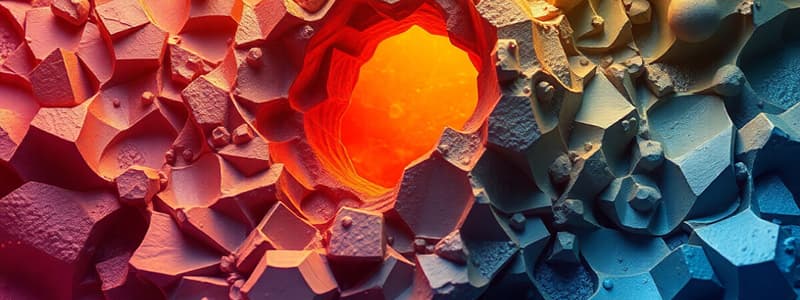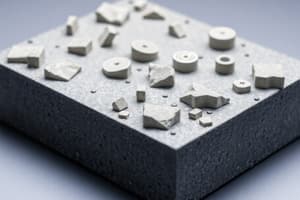Podcast
Questions and Answers
Which material property is primarily concerned with how a material responds to applied forces?
Which material property is primarily concerned with how a material responds to applied forces?
- Strain
- Load
- Stress (correct)
- Torque
Additive manufacturing processes are focused on sustainable materials.
Additive manufacturing processes are focused on sustainable materials.
True (A)
What is the primary function of a ski in relation to the human body?
What is the primary function of a ski in relation to the human body?
Force transmission for controlling the ski motion
The relation between stress and strain can be expressed via simple material __________.
The relation between stress and strain can be expressed via simple material __________.
Match the material properties with their descriptions:
Match the material properties with their descriptions:
Which of the following is not a focus area in the Engineering Design and Computing course?
Which of the following is not a focus area in the Engineering Design and Computing course?
The learning objective includes understanding only the categorization of materials without focusing on their mechanical behavior.
The learning objective includes understanding only the categorization of materials without focusing on their mechanical behavior.
What deformation behavior is particularly focused on in the study of materials?
What deformation behavior is particularly focused on in the study of materials?
Which of the following best describes 'Function' in engineering design?
Which of the following best describes 'Function' in engineering design?
A design's function and the chosen manufacturing process are unrelated.
A design's function and the chosen manufacturing process are unrelated.
What is one factor that fulfilling a function requires?
What is one factor that fulfilling a function requires?
The choice of material and target shape interact with the __________ process.
The choice of material and target shape interact with the __________ process.
Match the terms with their descriptions.
Match the terms with their descriptions.
Material choice affects which aspect of design?
Material choice affects which aspect of design?
Material elasticity is a type of material property that can impact function.
Material elasticity is a type of material property that can impact function.
What interaction is critical to consider during the design process?
What interaction is critical to consider during the design process?
Which of the following materials is considered a type of glass?
Which of the following materials is considered a type of glass?
Ceramics and glass are ductile materials.
Ceramics and glass are ductile materials.
Name one property that differentiates metals from ceramics.
Name one property that differentiates metals from ceramics.
____ are known for being lightweight materials used in various applications.
____ are known for being lightweight materials used in various applications.
Match the following material categories with their characteristics:
Match the following material categories with their characteristics:
Which of the following is not considered a type of polymer?
Which of the following is not considered a type of polymer?
Alloys are a type of hybrid material.
Alloys are a type of hybrid material.
What is the main property associated with steel?
What is the main property associated with steel?
______ is a polymer commonly used for plastic manufacturing.
______ is a polymer commonly used for plastic manufacturing.
Match the following materials with their categories:
Match the following materials with their categories:
Which material is specifically known for converting water into energy?
Which material is specifically known for converting water into energy?
Natural materials are a separate category from synthetic polymers.
Natural materials are a separate category from synthetic polymers.
Name a common use for aluminum in engineering.
Name a common use for aluminum in engineering.
What does the stress-strain curve typically represent?
What does the stress-strain curve typically represent?
Stress and strain can be computed by direct measurement of the material's dimensions alone.
Stress and strain can be computed by direct measurement of the material's dimensions alone.
What is the main purpose of clamping the sample in a testing machine?
What is the main purpose of clamping the sample in a testing machine?
The sample is tested in the ________ region, where it begins to deform permanently.
The sample is tested in the ________ region, where it begins to deform permanently.
Match the following testing concepts with their descriptions:
Match the following testing concepts with their descriptions:
What does Hooke's Law describe in terms of material behavior?
What does Hooke's Law describe in terms of material behavior?
The formula for stress $ au = E imes ext{strain}$ is a correct representation of Hooke's Law.
The formula for stress $ au = E imes ext{strain}$ is a correct representation of Hooke's Law.
What is the spring constant represented by in Hooke's Law?
What is the spring constant represented by in Hooke's Law?
In Hooke's Law, the change in length is referred to as __________.
In Hooke's Law, the change in length is referred to as __________.
Match the following symbols with their meanings in Hooke's Law:
Match the following symbols with their meanings in Hooke's Law:
Flashcards
Material Families
Material Families
Categorization of materials based on their common characteristics and mechanical behavior.
Mechanical Behavior of Materials
Mechanical Behavior of Materials
How materials react to forces, like stretching, compressing, or bending.
Stress
Stress
Force applied per unit area.
Strain
Strain
Signup and view all the flashcards
Material Laws
Material Laws
Signup and view all the flashcards
Material Deformation
Material Deformation
Signup and view all the flashcards
Ski Design Function
Ski Design Function
Signup and view all the flashcards
Engineering Design
Engineering Design
Signup and view all the flashcards
Product function
Product function
Signup and view all the flashcards
Design dependencies
Design dependencies
Signup and view all the flashcards
Shape dependency
Shape dependency
Signup and view all the flashcards
Material properties
Material properties
Signup and view all the flashcards
Manufacturing process
Manufacturing process
Signup and view all the flashcards
Material-Process interaction
Material-Process interaction
Signup and view all the flashcards
Geometry & Material
Geometry & Material
Signup and view all the flashcards
Function-Shape-Material
Function-Shape-Material
Signup and view all the flashcards
ABS
ABS
Signup and view all the flashcards
Metal
Metal
Signup and view all the flashcards
Polymer
Polymer
Signup and view all the flashcards
Alloys
Alloys
Signup and view all the flashcards
Aluminum
Aluminum
Signup and view all the flashcards
Hybrid Materials
Hybrid Materials
Signup and view all the flashcards
Ceramic
Ceramic
Signup and view all the flashcards
Hybrid
Hybrid
Signup and view all the flashcards
Hooke's Law
Hooke's Law
Signup and view all the flashcards
Young's Modulus (E)
Young's Modulus (E)
Signup and view all the flashcards
Force-Elongation Relationship
Force-Elongation Relationship
Signup and view all the flashcards
Stress-Strain Curve
Stress-Strain Curve
Signup and view all the flashcards
Linear Elastic Region
Linear Elastic Region
Signup and view all the flashcards
Plastic Region
Plastic Region
Signup and view all the flashcards
Material Model
Material Model
Signup and view all the flashcards
3D Printing
3D Printing
Signup and view all the flashcards
Study Notes
Engineering Design and Material Selection
- Lecture 10 focused on materials and their properties
- Course schedule included topics such as Introduction and Sketching, Engineering Design, Technical Drawing, CAD, and Material Selection
Learning Objectives
- Students will learn a categorization of materials into families and understand their mechanical behaviors.
- They will learn the definition and relation of stress and strain through simple material laws.
- Students will learn material deformation behaviors, focusing on bending, and its mathematical expressions.
Case Study: Ski Design
- Ski function: transmitting force from the user to the ski for motion control.
- Ski requirements: withstanding environmental forces, bending at desired levels by the skier, providing torsional resistance, reducing vibration, easy turning, and resistance to environmental factors (temperature and wear).
- Ski design compromises variables to match skier weight, technique, and use.
Overview - Design Dependencies
- Function: a product or system task independent of solutions
- Dependencies: fulfilling a function requires a specific shape, feature, size, specific material properties (e.g. elasticity and thermal properties), and interaction with the manufacturing process in selecting processable materials. Manufacturing process influences design function.
History: Material shapes technology
- Timeline of material development, showing the relative importance of different material families (e.g., stone, bronze, iron, polymers, ceramics, etc.) through history up to the 2020s
- Material shapes technology evolution
History: Material Technology
- Trends in material technology: closer interaction of shape, material, process, and function; multi-material designs; highly complex design spaces; computational design approaches including AI.
- Examples of emerging materials - floating steel, artificial trees, and multi-material designs.
Material Families
- Categorization of materials into families (steel, aluminum, cast iron, alloys, silica glass, soda-lime glass, borosilicate glass, polymers, ceramics, hybrid materials.)
- Properties of each family (e.g., metals are strong but can be heavy, polymers are lightweight).
- Importance of a common language to select materials
Life Cycles and Materials
- Organic and inorganic materials: characteristics and life cycles.
- Importance of material cycles (recycling, reusing, etc).
- Considerations for toxicity and disposal in materials handling
Question: Diving Board Material Selection
- Given a diving board design, students need to choose the most suitable material among the options: wood, steel, fiberglass, and glass.
Material Data Sheet: Stainless Steel
- Detailed properties of stainless steel, including electrical, optical, durability, and mechanical properties and manufacturing processes.
Categories of Material Properties
- Classifications of material properties: mechanical, thermal, electrical, optical, magnetic, chemical, economical, and ecological.
- Importance and limitations of using material properties as guidelines
Sustainability properties (Granta EduPack Eco-Audit)
- Data taken from Granta EduPack Eco-Audit on Material processing: CO2 footprint
- Factors to consider in sustainability
- Recyclability, Biodegradability, CO2 footprint, Water Usage, and Energy Consumption.
- Manufacture, Recycling, and Disposal considerations
Mechanical Properties
- Mechanical integrity as the foundation for product design.
- Importance of accurately quantifying material behavior.
- Calculating safety against potential failures
Mechanical Properties
- Relationship between forces, geometry, material behavior and induced deformations
- Importance of material properties being independent of geometry.
Stress and Strain
- Defining stress and strain concepts
- Defining stress as force per unit area
- Defining strain as material deformation relative to its initial shape
- Calculations of stress and strain according to material
Key Formulas
- Formulas related to stress and strain, including Hooke's Law.
- Formulas related to bending.
- Formulas related to second moment of area
Material Testing
- Procedure for determining stress-strain curves.
- Measuring and understanding mechanical properties to quantify material behavior
Bending and Torsion
- Bending deformation in materials: simultaneous compression and tension.
- Torsional deformations: relative motion of material layers
3-Point Bending Test
- Relationship between flexural rigidity and material properties (bending stiffness)
Bending: Second moment of area
- Geometric property reflecting the material distribution in the cross-section.
Bending Stiffness Distribution Along a Ski
- Analyzing the bending stiffness distribution for different ski types (racing/carving, touring).
Case Study: Ski Bending
- Case study of how to calculate bending in skis
Exercise: Materials and their Properties
- Students conduct an exercise involving Young's modulus calculation using flexural testers.
Studying That Suits You
Use AI to generate personalized quizzes and flashcards to suit your learning preferences.




